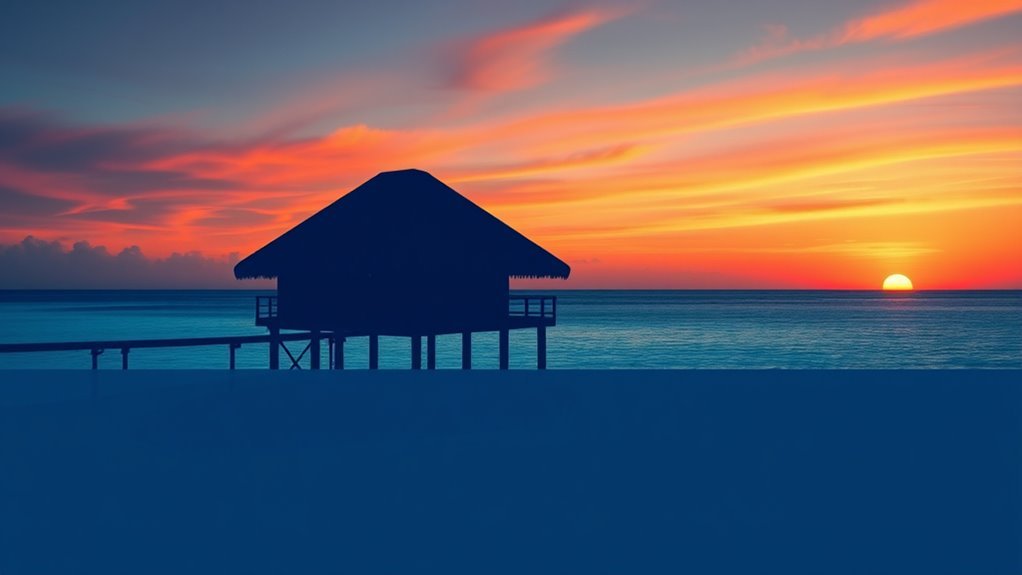The Marshall Islands offers diverse income streams. Traditional industries like fishing and copra production provide opportunities. Tourism thrives with untouched beaches and boutique hotels. The modern service sector sees growth in IT and finance creating skilled labor demands. Renewable energy, particularly solar, holds potential with government incentives. Investment in these areas can yield financial rewards. Further exploration into these sectors could reveal even more potential.
Main Points
- Capitalize on the growing tourism sector through boutique hotels, tours, and watersports rentals.
- Invest in renewable energy projects, like solar farms, to achieve energy independence and benefit from incentives.
- Explore opportunities in the modern service sector, specifically IT, telecommunications, and business process outsourcing.
- Sustainably engage in traditional industries such as fishing, copra production, handicrafts, and seaweed farming.
- Leverage government incentives and international aid programs to support new and existing business ventures.
Traditional Industries and Opportunities
Because the Marshall Islands is a remote island nation, its traditional industries revolve around marine resources and agriculture. Fishing, both subsistence and commercial, sustains many families. Copra production, derived from dried coconut, remains a significant export.
Small-scale farming of fruits and vegetables provides sustenance and local market income for locals.
Handicrafts made from local materials like shells and pandanus leaves are sold to tourists and locals alike. Seaweed farming offers another income diversification opportunity.
There are nascent opportunities in aquaculture and sustainable resource management. The government supports initiatives to enhance these traditional sectors through training and funding.
Tourism and Hospitality Ventures

Tourism presents considerable prospects for revenue generation and entrepreneurial endeavors in the Marshall Islands.
The nation’s untouched beaches, vibrant coral reefs, and World War II historical sites are attractive to tourists. Entrepreneurs can capitalize on this through several avenues such as:
- Establishing eco-tourism ventures, like guided dives.
- Creating boutique hotels or guesthouses offering unparalleled ocean views.
- Providing locally-guided tours highlighting Marshallese culture.
- Offering water sports activity rentals, such as kayaks and paddle boards.
Success necessitates adhering to sustainability principles, respecting local customs, and providing exceptional service to visitors seeking authentic experiences.
Modern Service Sector Growth
Beyond tourism and hospitality, the Marshall Islands is seeing an expansion in its modern service sector, presenting additional avenues for revenue generation.
This includes opportunities in information technology, telecommunications, and financial services. The demand for skilled labor in these areas is increasing, offering potential for training programs and employment.
Entrepreneurs can explore providing business process outsourcing, digital marketing, or software development services. Moreover, the government is actively promoting foreign investment in these sectors, creating a favorable environment for growth. The development of a robust digital infrastructure is crucial for sustaining this growth trajectory.
Renewable Energy Innovations
Given its geographical location, the Marshall Islands is uniquely positioned to harness renewable energy sources, particularly solar and wind power. Investment in these areas presents significant opportunities.
Innovations are crucial for energy independence and economic growth. Consider:
- Developing efficient solar farms on unused land.
- Implementing small-scale wind turbines suitable for atoll environments.
- Creating energy storage solutions to address intermittency challenges.
- Offering maintenance and repair services for renewable energy systems.
Such ventures can generate income while contributing to environmental sustainability and reducing reliance on imported fossil fuels.
Government incentives and international aid programs further support renewable energy projects.
Common Questions
What Are the Biggest Challenges for Foreign Investors?
Foreign investors commonly face hurdles in the Marshall Islands. Land ownership restrictions, bureaucratic inefficiencies, and limited infrastructure present significant challenges. Navigating cultural differences and understanding complex regulations further complicate investment prospects.
What’s the Cost of Living in Majuro?
Majuro’s cost of living is high due to reliance on imports. Housing is limited and expensive. Food costs are elevated. Utilities are costly, particularly electricity. Transportation adds to expenses, making it a relatively expensive place to reside.
Is Real Estate Ownership Restricted for Foreigners?
Real estate ownership in the Marshall Islands presents complexities for foreigners. Generally, land ownership is restricted to citizens. Foreigners can often lease land for extended periods, granting usage rights without direct ownership. Specific regulations should be verified with local authorities.
How Do I Obtain a Business License?
To obtain a business license, one must apply through the Registrar of Corporations. The application requires detailed business information. Compliance with local regulations is essential. A fee is usually associated with processing the application.
Are There Any Grants for Startups?
Startup grants in the Marshall Islands may exist, but availability fluctuates. Individuals should investigate government programs and international aid organizations. Checking with the Marshall Islands Chamber of Commerce is also advisable. Competition for funding can be intense for new businesses.